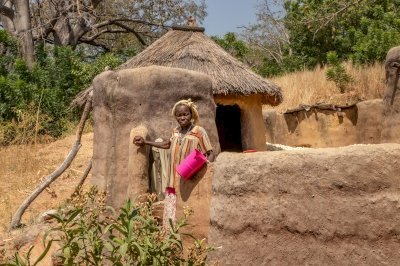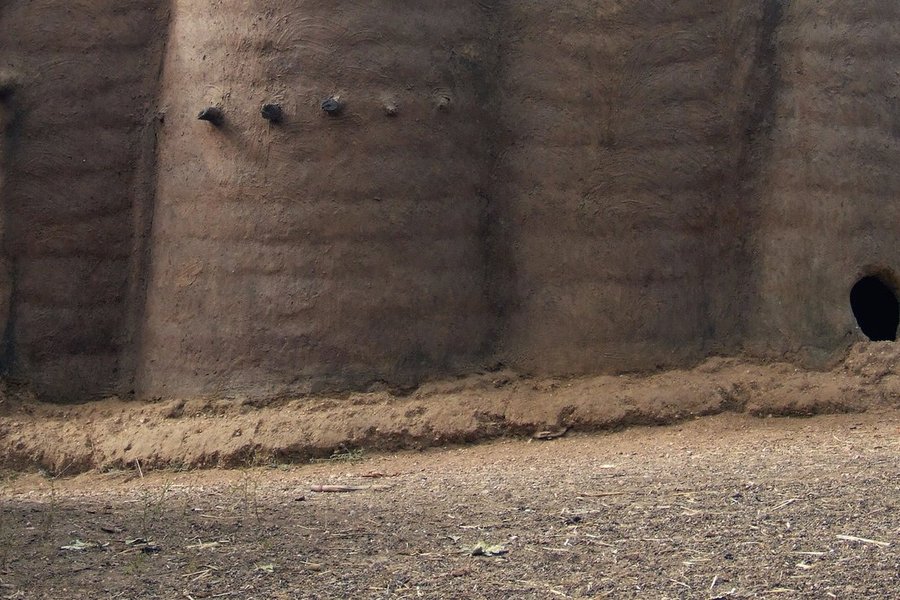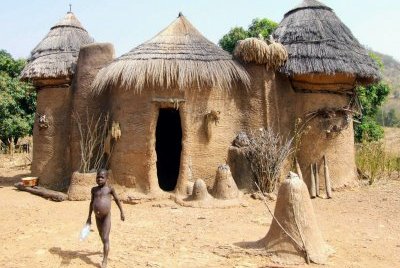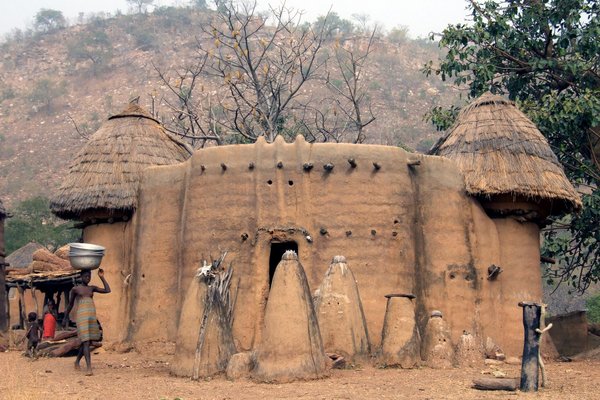Benin, Togo
Koutammakou
Koutammakou, the land of the Batammariba, represents a traditional way of settlement known for the architecture of mud “takienta” tower houses.
Most of these buildings have two stories, and either flat or conical thatched roofs. They combine domestic functions with space for animals and granaries. Koutammakou also is a living cultural landscape where the agricultural society lives in harmony with the surrounding nature. This is expressed in sacred forests, rocks and intangible elements.
Community Perspective: a highlight of a trip to Togo, where a local guide with appropriate knowledge, contacts and language is absolutely essential. Solivagant visited villages in both Togo and Benin, the latter proving "a more fruitful area for exploration and interaction with the Battamariba".
Site Info
Official Information
- Full Name
- Koutammakou, the Land of the Batammariba (ID: 1140)
- Status
-
Inscribed 2004
Site history
History of Koutammakou
- 2023: Extended
- To include area in Benin
- 2023: Advisory Body overruled
- ICOMOS advised Referral for Extension
- 2020: Revision
- Includes former TWHS Habitats fortifiées: Tata Somba (1987-1996)
- 2004: Inscribed
- Inscribed
- Type
- Cultural
- Criteria
- v
- vi
Links
- UNESCO
- whc.unesco.org
- Official
-
- togo-tourisme.com — Le paysage koutammakou
- Related
-
- afrol.com — Link
All Links
UNESCO.org
- whc.unesco.org — whc.unesco.org/
Official Website
- togo-tourisme.com — Le paysage koutammakou
Related Resources
- afrol.com — Link
Community Information
- Community Category
- Cultural Landscape: Continuing
Travel Information
Guided Tour Only
Recent Connections
-
Perfect Inscriptions
2004 -
Volta Basin
"Le Koutammakou est irrigué par une sér… -
Transboundary only
Togo
Connections of Koutammakou
- Geography
-
-
Sahel
-
On National Border
On Benin border -
Volta Basin
"Le Koutammakou est irrigué par une série de cours d’eau qui sont : Pendjari, Koumongou, Perma, Yerpao, Sinaïssiré (voir carte 8). Pendjari, Koumongou et Perma sont des affluents de la rivière Oti (au Togo) et du fleuve Volta (au Ghana)."
-
- Trivia
-
-
Minority communities
Batammariba
-
- Architecture
-
-
Conical roofs
are crowned with steeply pitched conical thatched roofs (AB ev) -
Earth Architecture
-
Vernacular architecture
-
- World Heritage Process
-
-
Transboundary only
Togo -
Country gained extra WHS by an extension
Benin -
Extended
To include area in Benin (2023) -
Perfect Inscriptions
2004 -
First inscriptions
Togo 2004 -
Only WHS in their country
Togo -
Transboundary sites
-
- Human Activity
-
-
Man-made Terraces
"Some of the fields are terraces on the hills."
-
- Constructions
-
-
Cemeteries
-
Tower-houses
Takienta tower houses -
Granaries
Some of the buildings include granaries (AB ev)
-
- WHS on Other Lists
- Timeline
-
-
Built in the 16th century
"L'origine des Batammariba reste encore relativement incertaine...En fait, la comparaison avec les traditions orales des autres groupes ethniques de la région tend à prouver que les Batammariba sont venus de régions situées à l'Ouest ou au Nord-Ouest de l'Atacora, certains précisant du Burkina-Faso... Comme les autres groupes ethniques de la région ils se seraient réfugiés dans cette zone entre les 16ème et 18ème siècles pour mieux se protéger de la domination que cherchaient à imposer les royaumes des Mossés, Gourmantché ou encore Mamprussi et Dagomba" (Nom File)
-
- Visiting conditions
-
-
Guided Tour Only
"There is a small fee that must be paid, and you must be accompanied by a local guide." (review Christravelblog)
-
News
No news.
Recent Visitors
Visitors of Koutammakou
- Ask Gudmundsen
- Bill Maurmann
- Bram de Bruin
- Christravelblog
- Eva Kisgyorgy
- Jarek Pokrzywnicki
- jonathanfr
- La Concy
- Loic Pedras
- Luis Filipe Gaspar
- Maja
- marcel staron
- Michael Ayers
- Mikko
- Paul Schofield
- Philipp Leu
- Pink Bunny
- Piotr Wasil
- Solivagant
- Stanislaw Warwas
- Szucs Tamas
- Thomas Buechler
- Thomas van der Walt
Community Reviews
Show full reviews
Koutammakou, the land of the Batammariba, is currently the only UNESCO World Heritage Site in Togo. If you are interested in local culture and ethnicities, visiting Koutammakou should be on your Togo travel itinerary. The site can be easily reached as a day trip from Kara via Kandé, which is a 2.5-hour drive one way. This day trip was the highlight of my Togo road trip itinerary. I left Kara at around 8:30 AM and arrived at the entrance at 10:00 AM. There is a small fee that must be paid, and you must be accompanied by a local guide. It is important to respect the local Tamberma people and their traditional way of life.
Tata or Takienta houses are mud and straw castles with a ground floor for livestock, a kitchen on the "middle" floor, and sleeping quarters on the roof. With one entrance and Voodoo deities protecting it, the homes are easily defendable. The Batammariba people live in small villages grouped around a water source and fertile land, and they maintain their long-standing traditions while living in harmony with nature.
For me, this was the highlight in Togo.I really enjoyed my visit and see the locals. When I left the were just brewing their local "beer"which I had the option to taste. If you have a overreacting stomach I would refrain from trying.
It's a site quite far away and maybe on many WHS visitors "to see list". The new Togo TWHS list is also …
Keep reading 0 comments
I lived in this area for two years as a Peace Corps Volunteer. It is truly an amazing people and an amazing cultural experience. The architecture is phenomenal and a prideful part of their lives. There is not a lot of infrastructure develped for tourists. So visitors need to be aware of that and accomodating. Organization for toursits can also be confusing as there is currently no good set up of finding a guide, renting a car, lodging, etc. Try and make sure who you are paying is really a local person and be respectful of the community. There have been some negative effects of tourism already. Children chase cars and people beg for gifts. Don't give out gifts. But always ask before taking photographs and pay them if they ask for money or give them some other small gift.
Keep reading 0 comments
Anyone interested in Ethnology, Architecture, Cultural landscapes or African culture generally should try to reach this site. It consists of an area of country in NE Togo and NW Benin which is inhabited by the Battamariba people (who were called Tamberma by the colonial administration – we were told this meant “Good Builders”). Their “fortified” mud-brick houses called “Tata” (or Takienta”) are remarkable both visibly and as an introduction to their entire way of life and to their (animist) beliefs (photo). Walking the hilly savannah between the “villages”, seeing the daily life and agriculture and going inside a few houses is a fine travel experience which we did in Jan 2007, covering villages in both Togo and Benin.
We reached the Togolese inscribed area of “Koutammakou” via a dirt road NE from Kande before crossing into Benin south of Boukombe. The areas we saw in both countries didn't seem to be as significantly on the international travel route as the Dogon country in Mali then was. However, visits to those Tata near to the road, which were all we saw in Togo, were somewhat more “touristy” than I had hoped, with displays of handicrafts for sale and calls for “cadeaux” from hordes of children. Across the Benin border the area (which was not then included in the UNESCO site) proved in our experience, more fruitful for exploration and interaction with the Battamariba as we were able to partake in a full day's walk reasonably well away from the roads. …
Keep reading 0 comments
